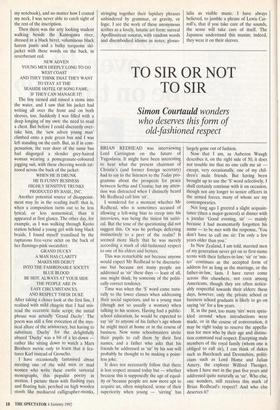TO SIR OR NOT TO SIR
Simon Courtauld wonders
who deserves this form of old-fashioned respect
BRIAN REDHEAD was interviewing Lord Carrington on the future of Yugoslavia. It might have been interesting to hear what the present chairman of Christie's (and former foreign secretary) had to say to the listeners to the Today pro- gramme about the prospects for peace between Serbia and Croatia; but my atten- tion was distracted when I distinctly heard Mr Redhead call him 'sir'.
I wondered for a moment whether Mr Redhead, who is sometimes accused of allowing a left-wing bias to creep into his interviews, was being the tiniest bit satiri- cal. But the tone of the questioning did not suggest this. Or was he perhaps deferring instinctively to a peer of the realm? It seemed more likely that he was merely according a mark of old-fashioned respect to one of his elders and betters.
This was remarkable not because anyone would expect Mr Redhead to be discourte- ous but because not many people are addressed as `sir' these days — least of all, one might think, by someone of the politi- cally correct tendency.
Time was when the 'S' word came natu- rally to the lower classes when addressing their social superiors, and to a young man (though not so usually a woman) when talking to his seniors. Having had a public- school education, he would be expected to say `sir' to anyone of his father's age whom he might meet at home or in the course of business. Now some schoolmasters invite their pupils to call them by their first names, and a father who asks that his friends be addressed as 'sir' by his son will probably be thought to be making a point- less joke.
It does not necessarily follow that there is less respect around today but — whether because this is supposedly the age of equal- ity or because people are now more apt to acquire an, often misplaced, sense of their superiority when young — `sirring' has largely gone out of fashion.
Now that I am, as Auberon Waugh describes it, on the right side of 50, it does not trouble me that no one calls me sir except, very occasionally, one of my chil- dren's male friends. But having been brought up to use the 'S' word selectively, I shall certainly continue with it on occasion, though not any longer to senior officers in the armed forces, many of whom are my contemporaries.
Not long ago I greeted a slight acquain- tance (then a major-general) at dinner with
a jocular 'Good evening, sir' — mainly because I had momentarily forgotten his name — to be met with the response, 'You don't have to call me sir: I'm only a few years older than you.'
In New Zealand, I am told, married men of my generation never get on to first-name terms with their fathers-in-law; `sir' or 'mis- ter' continues as the accepted form of address for as long as the marriage, or the father-in-law, lasts. I have never come across this elsewhere, not even among Americans, though they are often notice- ably respectful towards their elders: these days, however, only the private school or business school graduate is likely to go on saying `sir' for a few years.
If, in the past, too many 'sirs' were sprin- kled around when introductions were made, or in the course of conversation, it may be right today to reserve the appella- tion for men who by their age and distinc- tion command real respect. Excepting male members of the royal family (whom one is obliged to call sir), I can think of dukes such as Buccleuch and Devonshire, politi- cians such as Lord Home and Julian Amery, the explorer Wilfred Thesiger, whom I have met in the past five years and addressed quite naturally as 'sir'. Who else, one wonders, still receives this mark of Brian Redhead's respect? And who else deserves it?










































 Previous page
Previous page